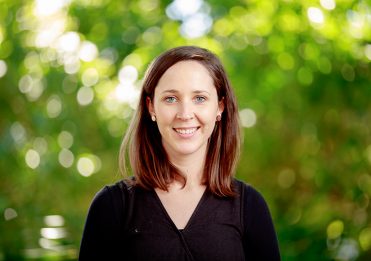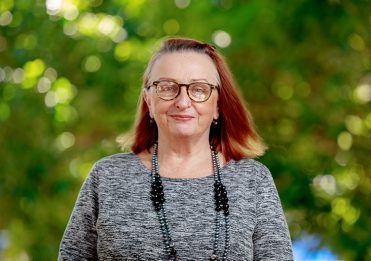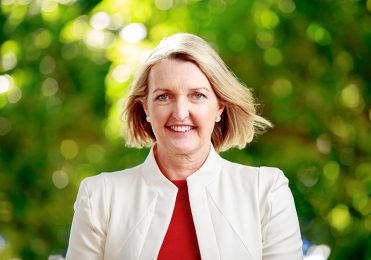By Mr James McIntosh
Director of Marrapatta Memorial Outdoor Education Centre
Originally published in February 2013
After the announcement of ‘Embrace the new! Link the Blue!’ as the 2013 motto and vision for the School, Marrapatta staff considered how our thematic approach to the outdoor education programme could support the student focus for the year. During the student leaders’ induction, Head Girls Elizabeth Redmond and Sophie Weir articulated ‘Embrace the new!’ as seizing opportunity offered in the myriad of new situations and challenges which will emerge throughout the year: new subjects, new classes and classmates, and a new Principal, Ms Euler. Their phrase ‘Link the Blue!’ encourages a renewed focus on connection with and contribution to Girls Grammar’s spirit with specific mention of friendships across the Year levels being a key goal.
The Student Council’s choice of motto captures the message of many academics, educators, psychologists, and neurobiologists who emphatically advocate for thoughtful engagement with personal and community-focused themes (Deak, 2010; Hudson, 2012; Seligman, 2011; Siegel, 2012). ‘Embrace the new!’ echoes the current research on adolescent health and wellbeing, resilience, optimism and the benefits of developing a growth mindset (Dweck, 2006), while ‘Link the Blue!’ relates to the innate human need for interpersonalconnection and nourishment through tangible relationships.
These themes have always held a foundational niche within education but their revived prominence is, among other factors, a response to the rising epidemic of anxiety and depression (Mission Australia, 2011), the emergence of new understandings into the intricacies of the human mind and brain, and the continuing breakneck pace of technological advancement. These complex dynamics have combined to create a whirlpool for students, parents, school communities, and society to navigate.
In order to effectively navigate this whirlpool, Dan Siegel, author and Clinical Professor of Psychiatry at UCLA, advocates greater attention to those influences which underscore academic achievement and fulfilment in life (2012). He provides a simple message for schools and communities to recalibrate applying what he refers to as the ‘3 Rs of resilience, relationships and reflection’ (2012). Siegel’s emphasis parallels the collective student voice of ‘Embrace the new! Link the Blue!’.
Resilience is often described as the ability to ‘bungy’ through life, rebounding from setbacks and failure in order to build a more capable self. For the adolescent of today, it is an empowering ability which is vital in the modern world (Barrett, 2012; Seligman, 2011). Resilience is a process of developing coping strategies, protective mechanisms and relationships, cognitive habits, self-care skills, and the ability to look at the future with optimism while integrating lessons from the past (Hudson, 2012, p. 54). There are no shortcuts to developing a resilience skillset; it cannot be purchased or acquired simply by reading a book. Developed over time, it is shaped by the layering of experiences combined with the way in which individuals process and hardwire their thoughts, emotions and behaviours.
While the foundation of a student’s resilience is laid during the formative years, the unique combination of developmental abilities, adolescence, and the variety of new experiences afforded during the high school years, creates a smorgasbord of opportunity to shape personal flexibility—from the butterflies of starting at a new school to navigating new friendships and teachers; from subject selections to deciding what tertiary path to take; and the many twists and turns, bumps and bruises, failures and triumphs, sadness and joy along the way. These emotive experiences are the essential ingredients required for resilience to thrive and flourish.
Complementing the need for resilience is Siegel’s second R, relationships, which is perhaps the most supported pre-requisite for health and wellbeing and, given the heightened sensitivities associated with adolescence, a key element for parents and schools to contemplate. In her book How Girls Thrive (2010), educator and psychologist JoAnn Deak promotes the need for girls to develop nourishing relationships as the most significant factor in establishing and maintaining a healthy self-esteem. She implores girls to ‘expand the band’ of relationships through connecting and interacting with a wide range of people, both peers and adults (Deak, 2010). ‘Expand[ing] the band’ develops the essential skills required in today’s increasingly connected global world and expands their scope of inclusiveness and social savvy-ness (Deak, 2010, p. 70).
Siegel’s third R, reflection, seems to draw his simple framework together though highlighting the lost art of slowing down, drawing breath, and reviewing one’s experiences. He refers to reflection as ‘time in’ (2012), where an individual consciously allows the brain’s central regulator, the pre-frontal cortex, to take separate elements and bring them together through the process of integration.
In his recently published book, Raising Resilient Teenagers, Chris Hudson describes self-reflection as one of the most difficult personal skills for teenagers to master, but one of the more valuable (2012, p. 64). By developing abilities to observe and evaluate their own thoughts, words and behaviours, adolescents become self-nurturing and able to manage their own circumstances. The role of parents and teachers is to provide encouragement, guidance, and enough personal space for these skills to develop so that adolescents become independent, confident, and self-reliant.
As students navigate the way through their adolescent journey, they are afforded many opportunities to develop their 3 Rs—and to ‘Embrace the new! Link the Blue!’. The School’s outdoor education program at Marrapatta is one such opportunity. Through the process of being active and engaged in the outdoors, students are drawn to contribute themselves—their ideas, abilities and energy—to their group and their class. They are encouraged to stretch themselves, to be the best they can be, to contribute thoughtfully, and to reflect on their performance.
Brisbane Girls Grammar School has a proud tradition of educating the whole person and focusing attention on those elements which shape and sculpt a student’s character. From classes that promote strenuous effort to pastoral programs that provide support and direction, each element contributes to enabling students to develop their social and emotional skills and abilities. The 3 Rs of resilience, relationships and reflection, together with the more traditional 3 Rs, are embedded in the core aspiration of the School to encourage the growth of young women who will flourish beyond the scope of Girls Grammar.
References
Barrett, P. (2012, January 16). Building resilience in the outdoors. Address presented at the National Outdoor Education Conference, University of Canberra.
Deak, J. & Adams, D. (2010). How girls thrive. United States: Green Blanket Press.
Dweck, C. (2006). Mindset: The new psychology of success. New York: Random House.
Hudson, C. (2012). Raising resilient teenagers: A parent’s guide to teenage self-esteem and resilience. Shellharbour, NSW: Charisbel.
Mission Australia. (2011). National survey of young Australians 2011: Key and emerging issues. Sydney: Mission Australia.
Seligman, M. E. (2011). Flourish: A visionary new understanding of happiness and wellbeing. New York: Free Press.
Siegel, D. J. (2012, May 2). Mindfulness and neural integration: Relationships and reflection in the cultivation of wellbeing. Retrieved February 11, 2013, http://drdansiegel.com/press/
Read reflective commentary from Director of Marrapatta Memorial Outdoor Education Centre, Mr James McIntosh, on his article, ‘Promoting the 3 R’s: Reflection, Relationships and Resilience’.
Six years after writing my original piece, the significance of cultivating the three R’s—reflection, relationships and resilience—has increased as we, as educators, learn more about the changing influences affecting students’ development during the crucial stage of adolescence.
In his recent book, Aware: The Science and Practice of Presence, Clinical Professor of Psychiatry and author, Daniel Siegel (2018), argues the practice of being present cultivates greater wellbeing, emotional intelligence and social connection.
The School’s .b mindfulness program is one initiative that promotes being present and focused on the task at hand. It is just one aspect of the broader Student Care program, and its application across all areas of the School that creates an atmosphere in which students can focus and thrive.
Of course, students must accept this supportive, and sometimes challenging, environment and be open and responsive to their experience of being present—being engaged and focused does not make challenges disappear, but can make the process of overcoming obstacles less daunting, and more rewarding.
Further it is not just students who need to understand the importance of experiencing the three R’s. Author and Principal, John Marsden, recently shared some advice for parents to consider as they navigate the space required for their adolescent children to develop into confident, well-rounded young people.
In his latest work, The Art of Growing Up, he highlights the dangers of parents removing the natural progressions that lay the foundations for adult life (Marsden, 2019). As parents, our natural instinct is to protect our children; however, we also need to enable them to experience and overcome challenges. Students need to learn to reflect on decisions and actions, develop resilience and understand the importance of relationships in providing support, guidance and encouragement.
Year 9 students are currently participating in their Outdoor Education Program. This week provides myriad opportunities for reflection, relationships and resilience. Completing their journeys encourages students to respond to the challenges that present themselves, and then reflect on their actions individually, and with the support of friends.
These experiences are just one way our students develop the three R’s, in a supportive School environment that provides encouragement and guidance when things get difficult.
References
Marsden, J. (2019). The Art of Growing Up. Macmillian: Australia.
Siegel, D.J. (2018). Aware: the science and practice of presence. Scribe: Brunswick, Victoria.




